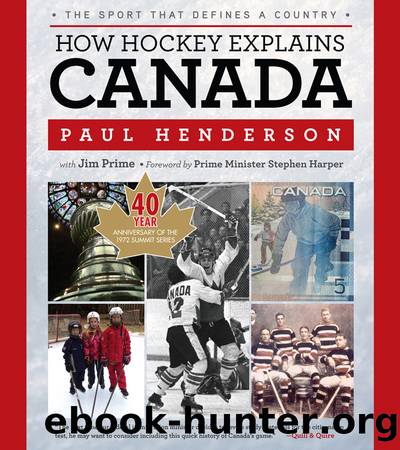How Hockey Explains Canada by Paul Henderson

Author:Paul Henderson
Language: eng
Format: epub
Publisher: Triumph Books
Published: 2011-03-15T00:00:00+00:00
Tony Esposito tended goal for the Chicago Blackhawks for 14 seasons. A key member of the 1972 Summit Series team, Esposito played in goal in four of the eight Series games, winning Games 2 and 7.
Bruce Bennett Studios/Getty Images
âThey were drinking and womanizing and to them it was just a laugh,â said former Hockey Night in Canada producer Ralph Mellanby, who was a consulting producer for television coverage of the Summit Series. âThey thought weâre going to kill these guys, but the scouting reports were bad, the players were misled. And they didnât have any goaltendingâ¦â The final score of Game 1 was a devastating 7â2 in favour of the Soviets.
âWe had never seen that,â said Mellanby. âWe didnât realize that they had invented a new way of playing hockey. We had never seen that before that first game. In our day, you picked up your man. I remember Esposito walking up to me after Game 5. He said, âWhere does Alexander Yakushev play? He lines up at centre then I canât find him. Iâm trying to find him to check him.â That wasnât the way [the Canadians] played. They played in zones. I said, âHe goes wherever he wants. Itâs like soccer.â Once our coaches got on to thatâand I give John Ferguson even more credit than Harry for thatâonce we learned how to break down their system, the coaching won it for us.â
Coach Sinden and his staff had done their best to purge the team of such overconfidence. âThey called Game 1 a wakeup call,â Sinden said. âIâll be honest with you. I was awake all the time. I think the rest of them were sleeping. They were cocky, although they were careful not to let it show too much, publicly or otherwise. But it was definitely there.â Sinden knew that between 1960 and 1972 a different group of people had taken over the international hockey program and their influence had resulted in changes that continued to evolve over the next 10 years. âIt was now more of a gentlemanâs approach to the contest for Canada,â said Sinden, who saw a connection between this evolution in style of play and Canadaâs dearth of championships.
âI tried to impress upon them that intimidation would not be a factor against the Soviets in this series,â Sinden added. âThose tactics werenât going to win in â72. I was convinced of that. We were going to have to match them in ability and skill. And it wasnât longâone game to be exactâbefore our team realized that. We did change. The Soviets were now expecting us to be pretty rugged because it was a professional team they were going to play, not the Canadian National Team. I knew how skillful these players were. And I knew from â58 and little bit from â60, they were on the same levelâthey improved a lot in the 10 years. They were on the same level as the NHL players.â
With few exceptions, the Canadian players came to the series out of shape, flabby from a summer of inactivity and too many sports banquets.
Download
This site does not store any files on its server. We only index and link to content provided by other sites. Please contact the content providers to delete copyright contents if any and email us, we'll remove relevant links or contents immediately.
Machine Learning at Scale with H2O by Gregory Keys | David Whiting(4300)
Never by Ken Follett(3942)
Liar's Poker by Michael Lewis(3445)
The Ultimate Backcountry Survival Manual by Aram Von Benedikt; Editors of Outdoor Life;(3262)
Will by Will Smith(2916)
The Partner by John Grisham(2396)
Can't Hurt Me: Master Your Mind and Defy the Odds - Clean Edition by David Goggins(2326)
Friends, Lovers, and the Big Terrible Thing by Matthew Perry(2221)
Taste by Kris Bryant(1860)
A Short History of War by Jeremy Black(1844)
HBR's 10 Must Reads 2022 by Harvard Business Review(1841)
A Game of Thrones (The Illustrated Edition) by George R. R. Martin(1729)
Never Finished: Unshackle Your Mind and Win the War Within by David Goggins(1706)
515945210 by Unknown(1664)
Why We Love Baseball by Joe Posnanski(1635)
The Arm by Jeff Passan(1606)
443319537 by Unknown(1548)
The Dodgers by Schiavone Michael;(1528)
The Yogi Book by Yogi Berra(1521)
